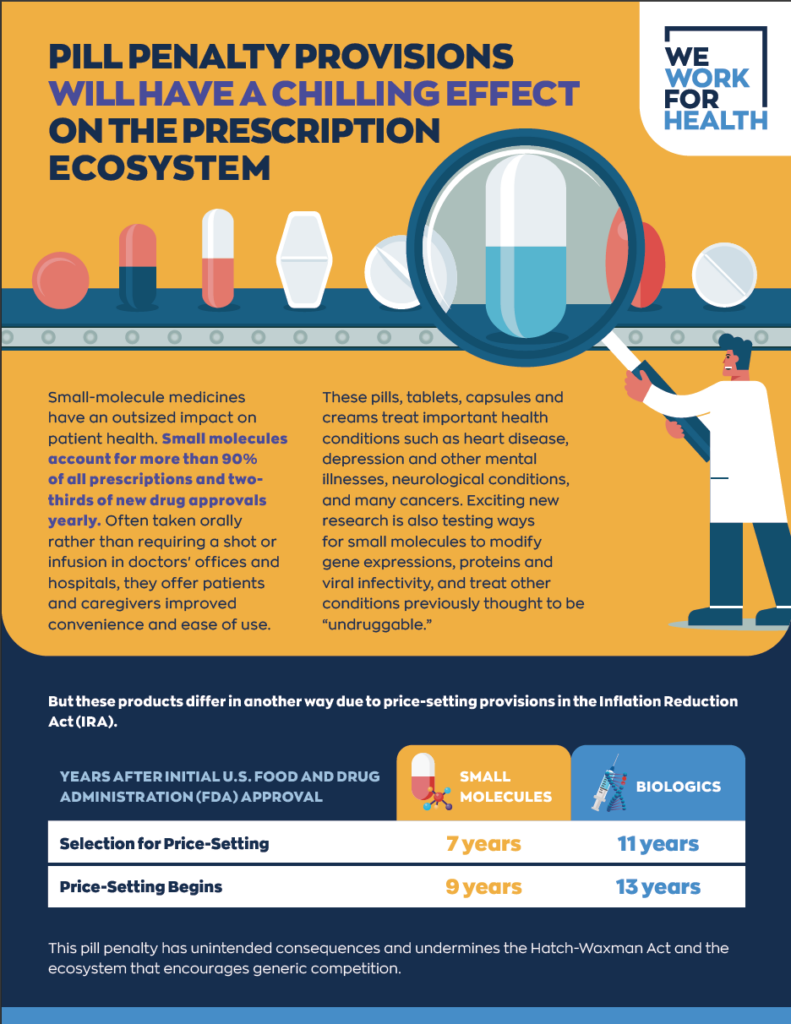Medicare Price “Negotiations” Will Jeopardize Patient Access to New Medicines, Result in Worse Health Outcomes
September 11, 2023
September 11, 2023
The Centers for Medicare & Medicaid Services (CMS) recently announced the first 10 drugs selected under its Medicare drug price “negotiation” plan, authorized by the Inflation Reduction Act (IRA) signed in to law last year. Over the next 4 years, Medicare will set prices for up to 60 drugs covered under Medicare Part D and Part B. This shortsighted move won’t control costs and threatens to limit patient access to new medicines, ultimately resulting in worse health outcomes for U.S. patients, warns ASBM.
IRA Changes Break a Successful Program
Michael Reilly, ASBM Executive Director and former Associate Deputy Secretary in the U.S. Department of Health and Human Services, worked on the development and implementation of the Part D prescription drug benefit during his six years in the Secretary’s Office. While proponents of government price-setting in Medicare claim this will create savings and lower costs, Reilly disagrees:
“Part D was designed following two decades of experience seeing government price-setting fail to control Medicare costs for services and healthcare provider rates. To avoid this happening with the new prescription drug benefit, we created a new model. Contrary to what many believe, under Part D, drug price negotiations do occur- they are conducted by pharmacy benefit managers (PBMs), and the law specifically forbid government interference in price-setting or formulary selection. As we intended, this approach has been incredibly successful in controlling costs: the Congressional Budget Office projected drug spending between 2004-2013 to be $770 billion; actual expenses were 45% lower- at $421 billion. It has a 90% approval rating among beneficiaries[1], premiums have held steady around $32/month since 2006, and it holds the distinction of being the only major federal program to ever come in under budget.”
A Better Reform: Ensuring Savings Are Passed Onto Patients
While price-setting proponents say beneficiaries will start to see lower drug prices beginning in 2026, there’s no evidence that this is true, and there are better ways to lower out-of-pocket costs- and much faster, Reilly explains. “Part D has been hugely successful in lowering costs- but these savings are not always being passed on to the patient by the PBMs. Thankfully, there is a broad bipartisan effort underway in Congress to rectify this and provide immediate relief for patients- this year, not in 2026.” No fewer than eight bills have been introduced or advanced out of committee this session, with bipartisan support, to address PBM rebate and pricing policies that result in higher drug prices for patients.
The Consequences of European-style Drug Price-Setting Policies
Not only will it fail to control costs, imposing European-style price controls on Medicare Part D will spell disaster for American patients in the coming years. Reilly remarks, “The U.S. leads the world in drug innovation and patient access precisely because we’ve rejected the kind of price controls that stifle R&D and delay drug availability in Europe and Asia.” For example:
- In the 1970s, European companies developed most new drugs; however, since the implementation of price controls in Europe, U.S. companies now produce 60% of new drugs, while European countries often have percentages in the single digits.[1]
- 90% of new cancer drugs are available in the U.S. within the first year, whereas fewer than half are available to cancer patients in Germany, the UK, France, and Canada[2]
- European cancer death rates are 1.7 times higher than in the U.S.[3]
Reilly describes what European-style health outcomes might look like in the U.S: “Imagine if the U.S. had European cancer death rates. That would translate to an extra 420,000 cancer deaths annually. Europe’s drug price-setting is simply not a policy worth emulating, and American patients should be aware of its public health consequences.”
ASBM Leading Education Efforts
ASBM has submitted comments to CMS critical of the policy and is conducting an educational campaign about the policy’s harmful effects. On July 26th, ASBM hosted a webinar with the Generics and Biosimilars Initiative (GaBI) to examine the price-setting policy’s impact on drug development and reduced patient access to new medicines. The event featured three former government officials who were instrumental in the development of Medicare Part D’s prescription drug benefit; as well as experts from the fields of cancer drug research and patient advocacy, each of whom voiced their strong concerns with the policy individually and in a panel discussion.
ASBM also maintains an educational microsite for the patient community at IRAPatientInfo.org
The Alliance for Safe Biologic Medicines (ASBM) is a diverse group of stakeholders that includes physicians, pharmacists, patient advocates, researchers, and biopharmaceutical manufacturers. Since 2010, ASBM has worked closely with regulators worldwide as they develop and implement health policies, to ensure that these reflect the best interests of patients.
[1] “Europe negotiates a poor vaccine rollout”; Forbes, April 2021
[2] IQVIA Analytics, FDA, EMA, PMDA, TGA, & Health Canada data, April 2021.
[3] “Democrat plan on drug costs will stifle innovation”, San Antonio Express-News, May 12, 2021
[1] https://www.usatoday.com/story/onpolitics/2012/10/03/poll-medicare-prescription-drug-program-popular/1609995/
